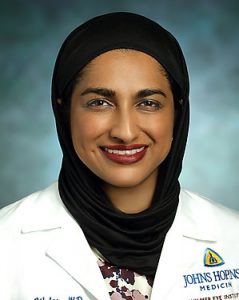Johns Hopkins UniversityEst. 1876
America’s First Research University
It’s been more than a decade since Shameema Sikder, MD, developed the concept of a cloud-based platform that incorporates surgical videos and artificial intelligence (AI) to assess a surgeon’s performance. Today that concept has evolved into Circlage, a commercial product that Sikder and her research team will launch in the spring of 2024 in collaboration with the Johns Hopkins Whiting School of Engineering and Johns Hopkins Malone Center for Engineering in Healthcare.

A combination of federal and state grants helped to fund Circlage, which was also assisted by the private sector. Yet during Circlage’s infancy, grateful patients became invested in the idea.
“They believed in us. Without their support, we wouldn’t have the pilot data or been able to hire the first set of graduate students,” says Sikder, the L. Douglas Lee and Barbara Levinson-Lee Professor of Ophthalmology and director of the Center of Excellence for Ophthalmic Surgical Education and Training. “Their philanthropic support has been tremendous.”
We sat down with Sikder to learn about the goals for Circlage, the benefits of a multidisciplinary research team, and the importance of leveraging AI.
Circlage will serve as a database where surgeons can organize their videos, index them, and create reference cases to share the videos with both their mentors and trainees. We want to create a digital report card — a performance assessment of how many errors were made and how well the performance was on an expert-to-novice spectrum.
We’ve done work on defining who is an expert. What we hope is that we can index a surgeon’s level of performance with videos so we can give video examples of how to improve, as well as examples of what can be done.
The key is how we can use AI to help optimize all of these steps, because ideally, the more we can automate and the more we can index and pull data together in a uniformed way, the more impact the technology will have.
In the year I was chief, surgical training and fostering the next generation of surgeons was important to me.
My engineering background made me think, “How can we make things more structured and optimize the experience for the learner?” I connected with the Whiting School and became a faculty member of the Malone Center. We discovered that within ophthalmology, we have an amazing opportunity to record what’s happening on the surgical field.
I watch videos of my own surgeries. I believe there’s value in it. With residents, it’s important to use the videos as a teaching tool.
Microsoft accelerated the development of the user interface. We participated in the Hexcite program led by Johns Hopkins Technology Ventures. We were introduced to a talented design partner, Cindy Brummer, who has a design studio, Standard Beagle, that helped us put together all the programming efforts we’re working on. We are excited to receive the support from the Maryland Innovation Initiative to commercialize Circlage.
We also received an R01 research project grant from the NIH. It’s been fundamental in helping us develop AI technologies and understand the impact of such a quantitative intervention in assessing skill. It’s been a tremendous boost to our work. In the beginning, Circlage was brushed off as an art, and now at the highest levels at the NIH it’s being recognized as a science. It’s extraordinary.
Without the clinical perspective, engineers alone can’t solve all of our problems. And without the help of engineers, the clinicians cannot come up with all of the solutions. A multidisciplinary approach is critical. It reflects what is amazing about being at Hopkins — you work with colleagues who are dedicated and passionate about what they do.
My main collaborators are Swaroop Vedula, MBBS, PhD, MPH, in the Malone Center and Vishal Patel, PhD, and Daniel Khashabi, PhD, in the Whiting School. Greg Hager, PhD, the Mandell Bellmore Professor of Computer Science, is a mentor of our work. Along with a number of faculty members, we have undergraduate and graduate students and clinical research fellows on our team.
It’s a good mix of people who are bringing all their different areas of interest and expertise to the group.
I would love for surgeons across the career spectrum to use Circlage because it helps them. Each surgery has a profound impact on our patients. If that element of intellectual curiosity coupled with the practical impact of clinical care can be optimized and made accessible for every surgeon in ophthalmology and outside of ophthalmology, it could have a very profound effect.
Topics: Faculty and Staff, Friends of Johns Hopkins Medicine, Whiting School of Engineering, Wilmer Eye Institute, Fuel Discovery